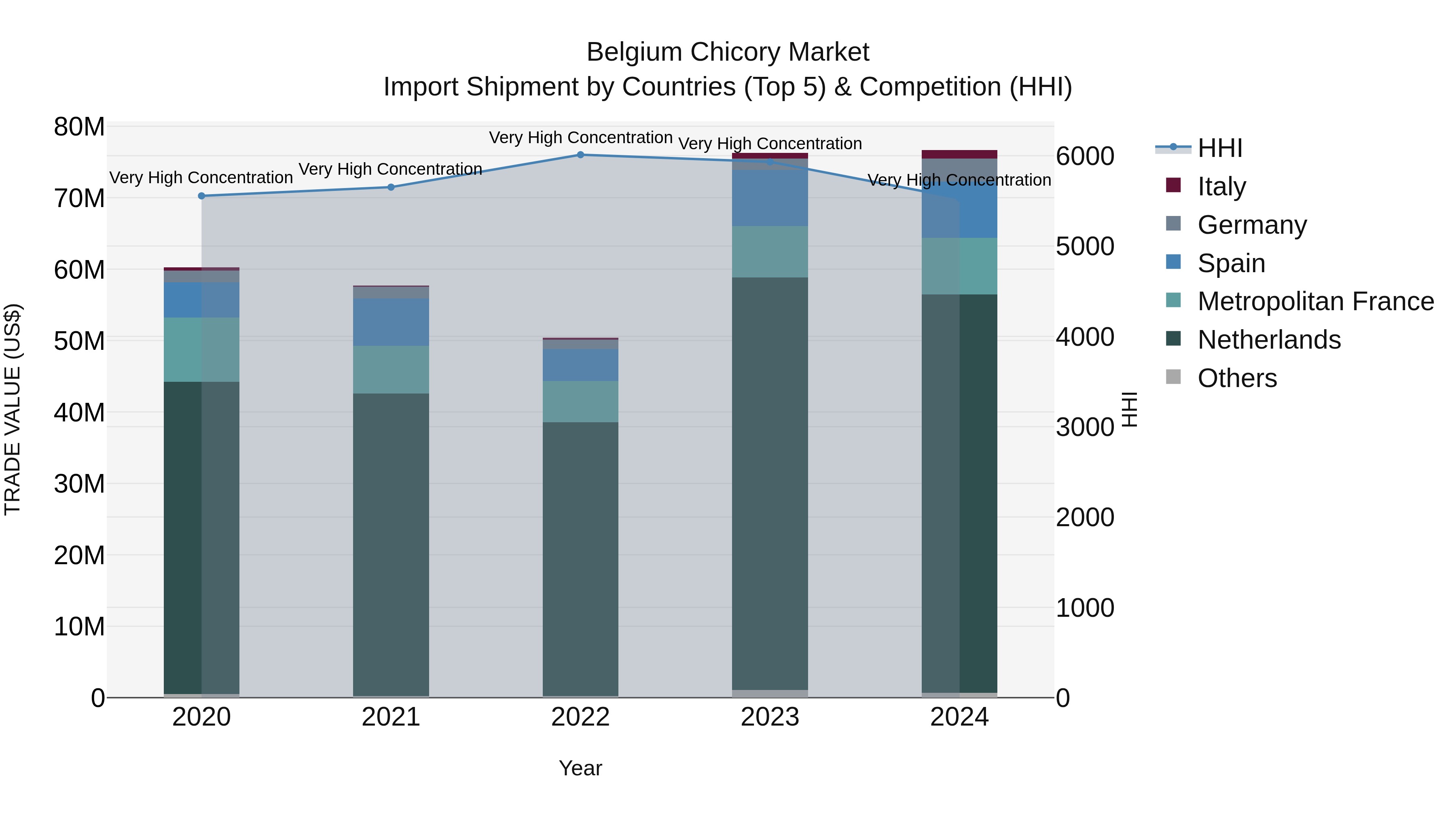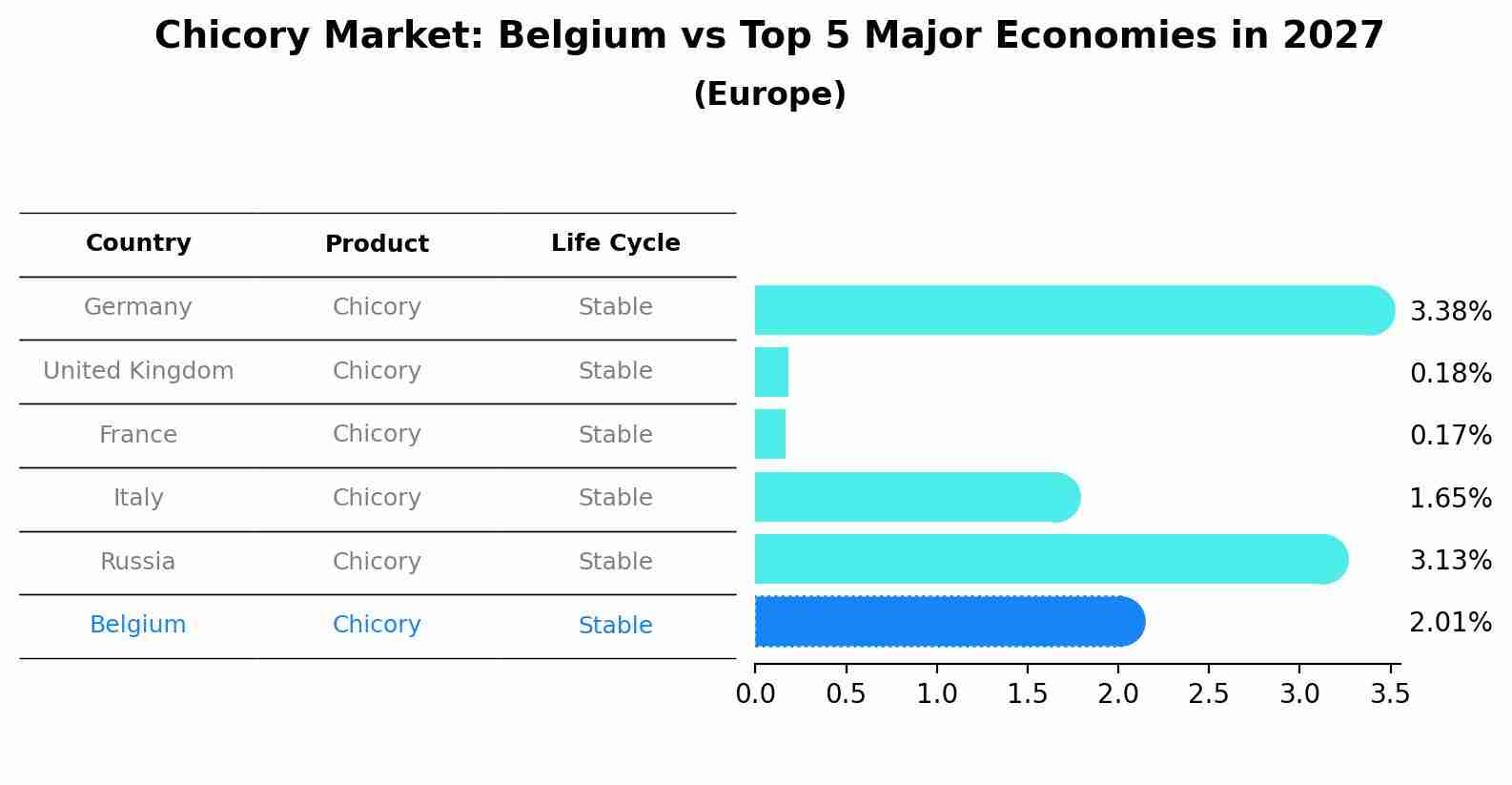Belgium Chicory Market (2025-2031) | Forecast, Outlook, Segmentation, Trends, Size, Value, Companies, Industry, Revenue, Share, Analysis & Growth
| Product Code: ETC4838942 | Publication Date: Nov 2023 | Updated Date: Oct 2025 | Product Type: Market Research Report | |
| Publisher: 6Wresearch | Author: Sachin Kumar Rai | No. of Pages: 60 | No. of Figures: 30 | No. of Tables: 5 |
Belgium Chicory Market Top 5 Importing Countries and Market Competition (HHI) Analysis
In 2024, Belgium continued to be a significant importer of chicory, with top suppliers being Netherlands, Metropolitan France, Spain, Germany, and Italy. The market displayed a high concentration with a stable Herfindahl-Hirschman Index (HHI). The Compound Annual Growth Rate (CAGR) from 2020 to 2024 stood at a healthy 6.2%, indicating consistent demand. Although the growth rate slightly slowed in 2024 with a 0.5% increase compared to the previous year, the overall outlook for chicory import shipments into Belgium remains positive and robust.

Chicory Market: Belgium vs Top 5 Major Economies in 2027 (Europe)
Belgium's Chicory market is anticipated to experience a stable growth rate of 2.01% by 2027, reflecting trends observed in the largest economy Germany, followed by United Kingdom, France, Italy and Russia.

Belgium Chicory Market Overview
The chicory market in Belgium is significant, with the country being one of the leading producers and consumers of chicory products. Used primarily as a coffee substitute and for its health benefits, chicory is gaining popularity. The market is driven by increasing health awareness and demand for natural and functional foods. Investments in chicory cultivation and processing technology are enhancing market growth.
Drivers of the market
The drivers for the Belgium chicory market include the growing consumer preference for natural and healthy food products. Chicory is widely recognized for its health benefits, including digestive health and prebiotic properties, which drive its demand in the food and beverage industry. The expanding market for coffee substitutes and the use of chicory in various culinary applications further contribute to market growth. Additionally, Belgium`s favorable climatic conditions and expertise in chicory cultivation support the production and supply of high-quality chicory products.
Challenges of the market
The chicory market in Belgium is challenged by fluctuations in raw material availability and prices, which can impact production costs and profitability. Chicory cultivation is susceptible to climatic conditions, and adverse weather can significantly affect crop yields. The market also faces competition from alternative sources of inulin and dietary fibers, which are key products derived from chicory. Additionally, there is a need for continuous research and development to improve chicory varieties and processing techniques to meet the quality standards demanded by end-users in the food and beverage, pharmaceutical, and cosmetic industries. Regulatory compliance and certification requirements add another layer of complexity to market operations.
Government Policy of the market
The chicory market in Belgium is supported by agricultural policies and subsidies aimed at promoting crop diversification and sustainable farming practices. The Belgian government, in line with the Common Agricultural Policy (CAP) of the European Union, provides financial support to chicory farmers. These subsidies encourage the cultivation of chicory as a valuable crop for both its root and leaf production. Government-funded research into improving chicory yield and quality further drives market growth.
Key Highlights of the Report:
- Belgium Chicory Market Outlook
- Market Size of Belgium Chicory Market, 2024
- Forecast of Belgium Chicory Market, 2031
- Historical Data and Forecast of Belgium Chicory Revenues & Volume for the Period 2021-2031
- Belgium Chicory Market Trend Evolution
- Belgium Chicory Market Drivers and Challenges
- Belgium Chicory Price Trends
- Belgium Chicory Porter`s Five Forces
- Belgium Chicory Industry Life Cycle
- Historical Data and Forecast of Belgium Chicory Market Revenues & Volume By Product Type for the Period 2021-2031
- Historical Data and Forecast of Belgium Chicory Market Revenues & Volume By Extracts for the Period 2021-2031
- Historical Data and Forecast of Belgium Chicory Market Revenues & Volume By Roasted for the Period 2021-2031
- Historical Data and Forecast of Belgium Chicory Market Revenues & Volume By Instant Powder for the Period 2021-2031
- Historical Data and Forecast of Belgium Chicory Market Revenues & Volume By Flour for the Period 2021-2031
- Historical Data and Forecast of Belgium Chicory Market Revenues & Volume By Form for the Period 2021-2031
- Historical Data and Forecast of Belgium Chicory Market Revenues & Volume By Powder for the Period 2021-2031
- Historical Data and Forecast of Belgium Chicory Market Revenues & Volume By Liquid for the Period 2021-2031
- Historical Data and Forecast of Belgium Chicory Market Revenues & Volume By Cubes for the Period 2021-2031
- Historical Data and Forecast of Belgium Chicory Market Revenues & Volume By Other forms for the Period 2021-2031
- Historical Data and Forecast of Belgium Chicory Market Revenues & Volume By Application for the Period 2021-2031
- Historical Data and Forecast of Belgium Chicory Market Revenues & Volume By Food & beverages for the Period 2021-2031
- Historical Data and Forecast of Belgium Chicory Market Revenues & Volume By Dietary supplements for the Period 2021-2031
- Historical Data and Forecast of Belgium Chicory Market Revenues & Volume By Feed & pet food for the Period 2021-2031
- Historical Data and Forecast of Belgium Chicory Market Revenues & Volume By Cosmetics & personal care for the Period 2021-2031
- Historical Data and Forecast of Belgium Chicory Market Revenues & Volume By Plant-part for the Period 2021-2031
- Historical Data and Forecast of Belgium Chicory Market Revenues & Volume By Root for the Period 2021-2031
- Historical Data and Forecast of Belgium Chicory Market Revenues & Volume By Leaf for the Period 2021-2031
- Historical Data and Forecast of Belgium Chicory Market Revenues & Volume By Other plant-parts for the Period 2021-2031
- Belgium Chicory Import Export Trade Statistics
- Market Opportunity Assessment By Product Type
- Market Opportunity Assessment By Form
- Market Opportunity Assessment By Application
- Market Opportunity Assessment By Plant-part
- Belgium Chicory Top Companies Market Share
- Belgium Chicory Competitive Benchmarking By Technical and Operational Parameters
- Belgium Chicory Company Profiles
- Belgium Chicory Key Strategic Recommendations
Frequently Asked Questions About the Market Study (FAQs):
Export potential assessment - trade Analytics for 2030
Export potential enables firms to identify high-growth global markets with greater confidence by combining advanced trade intelligence with a structured quantitative methodology. The framework analyzes emerging demand trends and country-level import patterns while integrating macroeconomic and trade datasets such as GDP and population forecasts, bilateral import–export flows, tariff structures, elasticity differentials between developed and developing economies, geographic distance, and import demand projections. Using weighted trade values from 2020–2024 as the base period to project country-to-country export potential for 2030, these inputs are operationalized through calculated drivers such as gravity model parameters, tariff impact factors, and projected GDP per-capita growth. Through an analysis of hidden potentials, demand hotspots, and market conditions that are most favorable to success, this method enables firms to focus on target countries, maximize returns, and global expansion with data, backed by accuracy.
By factoring in the projected importer demand gap that is currently unmet and could be potential opportunity, it identifies the potential for the Exporter (Country) among 190 countries, against the general trade analysis, which identifies the biggest importer or exporter.
To discover high-growth global markets and optimize your business strategy:
Click Here- Single User License$ 1,995
- Department License$ 2,400
- Site License$ 3,120
- Global License$ 3,795
Search
Thought Leadership and Analyst Meet
Our Clients
Related Reports
- India Kids Watches Market (2026-2032) | Strategy, Consumer Insights, Analysis, Investment Trends, Opportunities, Growth, Size, Share, Industry, Revenue, Segments, Value, Segmentation, Supply, Forecast, Restraints, Outlook, Competition, Drivers, Trends, Demand, Pricing Analysis, Competitive, Strategic Insights, Companies, Challenges
- Saudi Arabia Core Assurance Service Market (2025-2031) | Strategy, Consumer Insights, Analysis, Investment Trends, Opportunities, Growth, Size, Share, Industry, Revenue, Segments, Value, Segmentation, Supply, Forecast, Restraints, Outlook, Competition, Drivers, Trends, Demand, Pricing Analysis, Competitive, Strategic Insights, Companies, Challenges
- Romania Uninterruptible Power Supply (UPS) Market (2026-2032) | Industry, Analysis, Revenue, Size, Forecast, Outlook, Value, Trends, Share, Growth & Companies
- Saudi Arabia Car Window Tinting Film, Paint Protection Film (PPF), and Ceramic Coating Market (2025-2031) | Strategy, Consumer Insights, Analysis, Investment Trends, Opportunities, Growth, Size, Share, Industry, Revenue, Segments, Value, Segmentation, Supply, Forecast, Restraints, Outlook, Competition, Drivers, Trends, Demand, Pricing Analysis, Competitive, Strategic Insights, Companies, Challenges
- South Africa Stationery Market (2025-2031) | Share, Size, Industry, Value, Growth, Revenue, Analysis, Trends, Segmentation & Outlook
- Afghanistan Rocking Chairs And Adirondack Chairs Market (2026-2032) | Size & Revenue, Competitive Landscape, Share, Segmentation, Industry, Value, Outlook, Analysis, Trends, Growth, Forecast, Companies
- Afghanistan Apparel Market (2026-2032) | Growth, Outlook, Industry, Segmentation, Forecast, Size, Companies, Trends, Value, Share, Analysis & Revenue
- Canada Oil and Gas Market (2026-2032) | Share, Segmentation, Value, Industry, Trends, Forecast, Analysis, Size & Revenue, Growth, Competitive Landscape, Outlook, Companies
- Germany Breakfast Food Market (2026-2032) | Industry, Share, Growth, Size, Companies, Value, Analysis, Revenue, Trends, Forecast & Outlook
- Australia Briquette Market (2025-2031) | Growth, Size, Revenue, Forecast, Analysis, Trends, Value, Share, Industry & Companies
Industry Events and Analyst Meet
Whitepaper
- Middle East & Africa Commercial Security Market Click here to view more.
- Middle East & Africa Fire Safety Systems & Equipment Market Click here to view more.
- GCC Drone Market Click here to view more.
- Middle East Lighting Fixture Market Click here to view more.
- GCC Physical & Perimeter Security Market Click here to view more.
6WResearch In News
- Doha a strategic location for EV manufacturing hub: IPA Qatar
- Demand for luxury TVs surging in the GCC, says Samsung
- Empowering Growth: The Thriving Journey of Bangladesh’s Cable Industry
- Demand for luxury TVs surging in the GCC, says Samsung
- Video call with a traditional healer? Once unthinkable, it’s now common in South Africa
- Intelligent Buildings To Smooth GCC’s Path To Net Zero


















